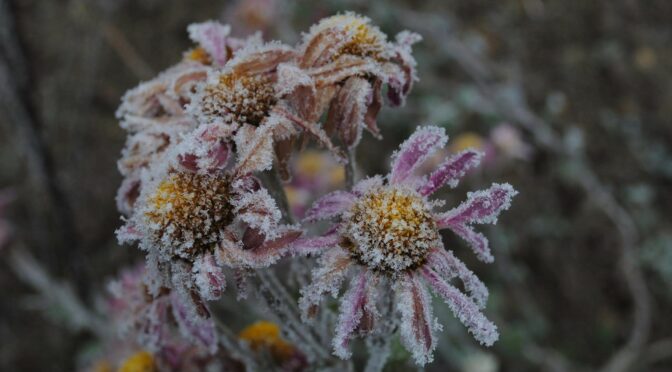This fall, we’ve loved seeing an increased awareness about how pollinators and other beneficial insects are affected by garden clean-up. These creatures overwinter in organic debris such as plant stems, seed pods, and leaves. Overwintering songbirds also utilize this debris for habitat and food sources.
So do we leave our garden as is in the fall for wildlife? No, we remove some material, leave some, and add some. These autumn chores are essential for the health and productivity of next year’s garden. Here’s what we recommend to keep your garden healthy and give wildlife a helping hand:
Clean up diseased plants.
In the fall, any diseased plant material should be removed from the garden and burnt, buried away from any garden beds, or composted in a well-managed compost pile that reaches at least 140°F.
Nightshades or members of the Solanaceae family, including peppers, potatoes, tomatoes, and eggplants, are common candidates. These plants are affected by fungal diseases such as Alternaria (early blight), late blight, verticillium wilt, and fusarium wilt, which can overwinter in dead plant material.
You should also remove plants like cucumbers and squashes that have been affected by Downey Mildew.
Don’t leave soil bare over the winter.
If your first frost is still several weeks away, you should be sowing cover crops like clover, Austrian winter peas, or winter rye in open beds. Cover crops prevent erosion, suppress weeds, add organic matter and nutrients to the soil, and provide habitat for beneficial insects, bacteria, and fungi.
However, depending on what zone you’re in, if you haven’t sown any fall cover crops at this point, you may want to use mulch instead. A thick layer of mulch can help provide a winter habitat for beneficial insects, bacteria, and fungi. It also suppresses weeds, slowly adds organic matter as it breaks down, and protects the soil from winter weather. We talked more in-depth about mulch in a previous post, but you can use straw, hay, old leaves, or wood chips.
Leave the leaves!
We’ve been taught that our yards and gardens should look tidy, but there’s nothing wrong with leaving autumn leaves right where they fall. They’ll break down and add organic matter and nutrients to your lawn and garden.
If you have places you want to remove leaves from, such as pathways to your home, there are a couple of great uses for them. You can add them to your compost pile; they’re a great source of carbon. You can also use leaves as an excellent free mulch to protect soil or perennial and overwintering plants like garlic, fruit trees and shrubs, strawberries, rhubarb, or tulips.
Don’t cut back seed-bearing flower heads.
Dead flower stalks are some of our favorite plants to leave standing. A few great choices include sunflowers, echinacea (coneflowers), bee balm (monarda), and rudbeckia (black-eyed Susans). The stems from many species are ideal places for native bees. You might also spot songbirds using them as winter perches and searching them for any leftover seed. They also add a bit of beauty to the winter landscape. Frost-covered seed heads are a lovely morning view.
Plant more flowers.
Depending on your zone, you may still be able to sneak in a few flower seeds and bulbs. Many native flowers are excellent choices for fall sowing because their seeds are adapted to spending the winter in the soil in our climate. Check out our post, Spring Flowers: Fall Sowing, for a list of flowers that can be fall sown.
Do cut back pest-infested material.
Another instance where we opt to remove and burn plant material is when it is infested with pests that may overwinter in the material. An excellent example of this is asparagus stalks that were infested with asparagus beetles. After they turn brown and die back in the fall, it’s a good idea to cut them about 2 inches above the soil and burn them.
Other November odds and ends:
- Drain the gas from rototillers and other equipment that will sit all winter.
- Bring in terracotta pots that can crack during freeze and thaws.
- Drain and store hoses and sprinklers.
- Clean and oil garden tools before storing them. This also helps fungal diseases from being transmitted to other garden beds.
As organic gardeners, we strive to work with nature. Following these simple ideas can limit time spent on clean-up, help build healthy soil, and increase the number of birds and beneficial insects in and around our gardens.

